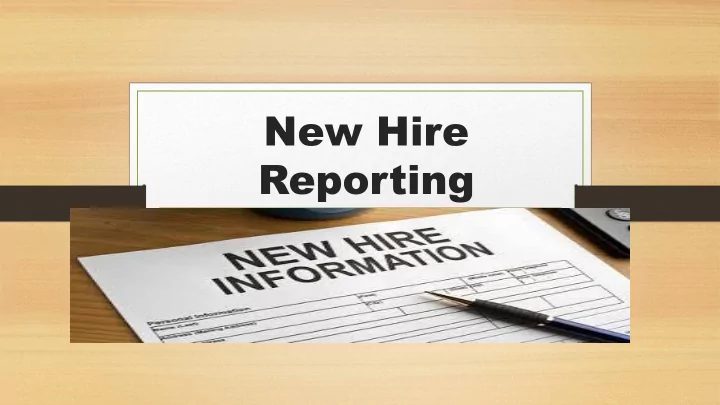

New Hire Reporting
Why is new hire reporting required? • 1996 Congress enacted a law called the Personal Responsibility and Work Opportunity Reconciliation Act (PRWORA). This legislation created the requirement for employers in all 50 states to report new hires • Speeds up the child support income withholding process • Expedites collection of child support from parents who change jobs frequently • Helps children receive the support they deserve
Why is new hire reporting required? • Quickly locates non-custodial parents to help in establishing paternity and child support orders • Employers serve as key partners in ensuring financial stability for many children and families
Is the reporting process a burden to employers? • The majority of the information you submit is already collected when your employee completes a W-4 form. • Although the reporting process is an additional requirement, the majority of employers participating in state-established programs report "no" or a "minor" cost impact on their operations.
What is done with the information? • Submit the New Hire reports to the National Directory of New Hires (NDNH). • Matches with employment security systems to prevent fraudulent or erroneous payments from Unemployment, Worker’s Compensation, or Public Assistance.
Employers are required to: • Verify Employment • Implement Garnishments • Send Payments • Implement Medical Support • Notify of Terminations
Who is required to report? Employers and/or labor organizations doing business in the State of West Virginia must report employees (Employers may also ask their payroll or accounting service to report)
Types of Employees Reported • New employees • Re-hires or Re-called employees • Temporary employees • Independent contractors who receive compensation or execute a contract for services performed when payment for services equals or exceeds $2500.00 in any year
What has to be reported? • Employee’s full name, address, Social Security Number, state of hire (if reporting as a Multistate employer), and start date • Employer’s corporate name, address where Income Withholding Orders should be sent, and the Federal Employer Identification Number (FEIN). If there is more than one FEIN, use same FEIN used to report quarterly wage information
What is the “Date of Hire?” • The "date of hire" is the day an individual first performs services for wages.
Lay-off/Leave of Absence • If the employee must fill out a new W-4 Form or has been separated from employment for more than 60 days. Resubmit the information
When do employers report? • Within 14 days after the employee is hired, re-hired, or returns to work • Reporting for independent contractors must occur at the time the contract is executed or the first payment, whichever is earlier
Multistate employer reporting • Employers with employees in more than one state may report all new hire information to a single state, provided they register with the Secretary of Health and Human Services using one of these methods: • Online Registry • Paper Form
What if an employer fails to report? Per 42 USC 653(a) and WV Code 48-18-125(h): • $25 fine for each new employee not reported. • The fine can increase to $500 for each new employee not reported if the failure to report is a result of a conspiracy between the employer and the employee.
Recommendations • It is strongly recommended that employers also report the payroll office address if different from the FEIN address. • It is critical that employers report both new hires and quarterly wages using the same FEIN. • If employers report under different FEINs, it could appear that they are not complying with new hire reporting requirements
Collection of Support • 70-75% of payments due are collected through garnishments. • Child Support agencies have two days to send a garnishment request once a match is received from New Hire Reporting.
Locate and Communicate • It is estimated that more than 30 percent of child support cases involve parents who do not live in the same state as their children. • By matching this New Hire data with child support case information, parents can be located who are living in other states.
Recommend
More recommend